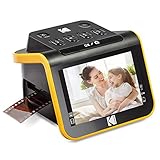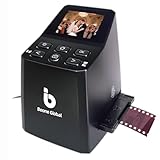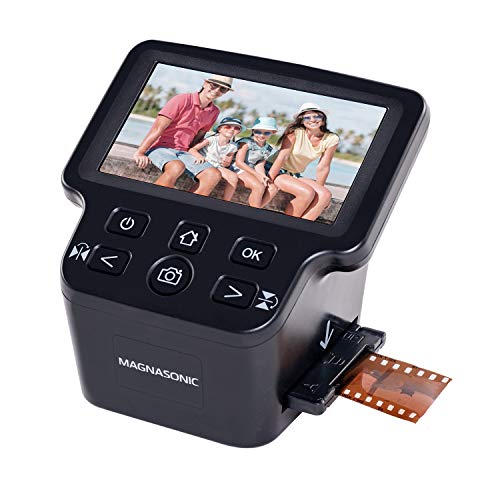Shoeboxes of family slides feel urgent when colors start to fade and time gets tight—you want them digitized without a crash course in pro gear. The right home scanner should be affordable, quick to set up, and deliver clean, true-to-memory files. That means smart trade-offs between speed, resolution, and ease of use so you actually finish the project.
We analyzed, compared, and ranked 10 slide scanners. The KODAK Slide SCAN Film earned 91/100 for crisp results and simple SD card workflow, while the KODAK SCANZA Digital Film scored 90/100 with approachable menus and reliable color. We also highlight specialized picks for fast batch jobs, higher-resolution archiving, and best value if you’re watching the budget.
Expect clear guidance by budget, workflow, and film type, plus practical notes on dust and scratch removal, macOS/Windows compatibility, and true plug-and-play standalone options. You’ll know which model fits your timeline, your tech comfort, and the quality you want for long-term home archiving.
When you buy through links on our site, we may earn a commission at no cost to you. We evaluate products independently. Commissions do not affect our evaluations. As an Amazon Associate, we earn from qualifying purchases.
Top Picks

Home Slide Scanner Showdown 2026: 10 Best-Value Picks for Family Archives
| Specifications | ||||||||||
|---|---|---|---|---|---|---|---|---|---|---|
| Rating | 91/100 | 90/100 | 80/100 | 79/100 | 79/100 | 77/100 | 75/100 | 74/100 | 69/100 | 68/100 |
| Max output resolution | 22 MP | 2240 dpi | 5472×3648 Pixels (20 MegaPixels) | 24 MP | 22 MP | 22 MP | 24 MP | 22 MP | 25 MP | 16 MP |
| Supported film types | 135, 126, 110 | 35mm, 126, 110, Super 8, 8mm | 35mm, 127, 126, 110, APS | 135, 126, 110, Super 8 | 35mm, 110, 126 | 35mm, 110, 126 | 35mm, 126, 110, Super 8, 135 | 35mm, 126, 110, Super 8, 8mm | 35mm, 126, 110, Super 8, 135 | 35mm, 135, 126 |
| LCD screen size | 5.0-inch | 3.5-inch | 4.3-inch | 5.0-inch | 7.0-inch | 5.0-inch | 5.0-inch | 2.4-inch | 5.0-inch | 2.31-inch |
| HDMI output | N/A | N/A | Yes | N/A | N/A | N/A | Yes | N/A | Yes | N/A |
| Year | 2020 | 2017 | 2017 | 2025 | 2023 | 2020 | 2020 | 2018 | 2023 | 2025 |
KODAK Slide SCAN Film
photographers needing a fast, inexpensive, standalone way to turn slides/negatives into share-ready JPEGs (great for family archives and quick social sharing).
- Plug-and-play, standalone scanning with 5″ LCD and SD-card output — excellent for rapid shoebox digitizing
- Affordable mid/entry price ($189.99) that matches budget-minded family archivists
- Strong social proof: high sales velocity, large review count and solid 4.4★ rating
- Basic consumer feature set — no RAW/DNG output, limited color-depth/dynamic-range compared with film-scanner software workflows
- No hardware dust/scratch removal (no Digital ICE/infrared) and limited restoration tools for serious cleanup
Want to convert hundreds of slides quickly and without fuss? You get a true plug-and-play scanner that previews on a 5″ screen and writes 22MP JPEGs directly to an SD card — so you can digitize shoeboxes fast and drop images straight onto a digital frame or Facebook. The tradeoff: you give up high-end archival features (RAW/TIFF output, infrared dust/scratch removal, and studio-grade dynamic range), but in return you gain speed, simplicity, and a wallet-friendly price that gets memories digital today.
Top Pick Overview:
The KODAK Slide N SCAN provides fast, no-hassle digitizing for families and hobbyists ready to rescue boxes of slides and negatives — which is why it lands as our #1 pick with a strong 91/100 score. You get a simple, standalone workflow that turns film into share-ready images without a computer.
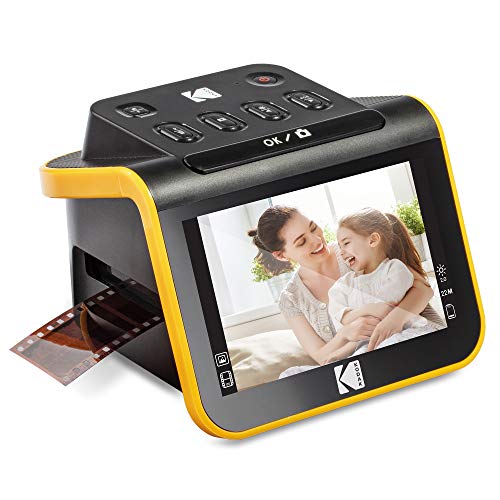








Scanning Quality & Workflow:
Preview on the bright 5-inch LCD, then save crisp 22MP JPEGs straight to an SD card for instant viewing on a digital frame or TV. The included trays handle 135/126/110 film, and USB-C power plus HDMI output keeps setup easy at the kitchen table or family reunion.
Who It’s For:
If you want speed and simplicity, this scanner keeps momentum high as you work through hundreds of frames in a weekend. Perfect for: family archives, quick social sharing, digitizing mixed film formats. Who is this for? Anyone who values a clean, share-ready JPEG workflow over complex software sessions.
Standout Features & Value:
You get a roomy 5-inch LCD preview, plug-and-play standalone design, SD card capture, and easy-load trays that minimize handling. Modern USB-C power and HDMI viewing add flexibility, and broad compatibility with 135/126/110 film boosts long-term usefulness. Strong buyer reviews underline dependable results at a budget-friendly price.
Our Verdict:
Final recommendation: Choose this model if you need a fast, affordable way to bring old slides and negatives into the present with minimal fuss. It delivers a strong price-to-performance ratio with practical features that help you finish the job and start sharing memories today.
KODAK SCANZA Digital Film
Photographers and family archivists needing a fast, affordable, standalone slide/film-to-JPEG solution for sharing and casual archiving (not for archival-grade RAW scanning or professional restoration).
- Truly plug-and-play: standalone operation with built-in 3.5″ LCD and direct SD-card save (no PC required)
- Multi-format adapters: handles 35mm, 126, 110, Super 8 and 8mm with easy-load inserts
- Strong value and popularity at this price point — affordable entry-level scanner with wide customer adoption
- Optical limitations: small sensor + interpolated 14/22MP claims — not equivalent to high optical DPI needed for archival A4+ prints
- No advanced dust/scratch removal (Digital ICE/infrared) and no RAW output — extra cleaning/restoration work required for serious restorations
Want to digitize a shoebox of slides fast and share them? You can pop in inserts, preview on the built-in screen, and save hundreds of JPEGs straight to an SD card without a computer — you’ll have shareable images in minutes. The tradeoff: you won’t get archival-grade RAW files or built-in infrared dust/scratch removal, so expect to do some spot-cleaning or extra restoration on keepsakes you plan to print large.
Overview & Ranking:
The Kodak SCANZA Digital Film scanner provides fast, computer-free digitizing for families and hobbyists. It earns the #2 spot in our lineup for its excellent convenience, versatile format support, and a strong 90/100 score.









Practical Use & Setup:
Pop in the easy-load inserts, preview on the 3.5-inch LCD, and save images straight to an SD card up to 128GB. With standalone operation and direct SD-card save, you can work at the kitchen table and turn a shoebox of slides into shareable files in one afternoon.
Compatibility & Output:
Adapters cover 35mm, 126, 110, Super 8, and 8mm, so you can handle mixed family collections with one device. You get quick JPEG files at 14/22MP settings for sharing, plus HDMI and USB for easy viewing and transfer.
Who It’s For:
Who is this for? You want an easy, budget-friendly way to bring film memories into your digital life without a complex setup. Perfect for: shoebox digitizing, family sharing, casual restorations.
Our Verdict:
Final recommendation: Choose this model if you need a simple, all-in-one workflow that moves fast and delivers share-ready results. Its multi-format adapters, 3.5-inch LCD, and direct SD-card save combine for standout convenience, making it a smart value pick for at-home archiving.
Wolverine Titan 8-in-1 High
Budget-minded family archivists and casual hobbyists who need fast, easy, plug-and-play conversion of large slide or negative shoeboxes into JPEGs for sharing or digital frames — not for high-end archival-quality scans.
- Plug-and-play standalone operation (no PC/software needed) — great for rapid batch digitizing
- Very affordable price ($99.99) with wide format support (35mm, 110, 126, 127, APS)
- Fast throughput (≈3 seconds per frame), speed-load adapters, and HDMI/4.3″ screen for quick review
- Image quality and dynamic range are limited compared with dedicated film scanners (no RAW output)
- No infrared dust/scratch removal (Digital ICE) or robust software controls — poor for heavy restoration work
Need to convert hundreds of old slides quickly? You get a cheap, easy-to-use standalone scanner that writes JPEGs to an SD card or displays on your TV so you can clear out shoeboxes in hours, not weeks. The tradeoff: you won’t get the tonal range, RAW files, or dust-removal you would from a mid-range film scanner — but you’ll have shareable, viewable digital copies fast and with almost no setup.
Overview & Ranking:
This film-to-digital converter provides fast, no-fuss archiving for families and hobbyists. It ranks #3 with a solid 80/100 for its quick operation, broad film support, and friendly standalone design.
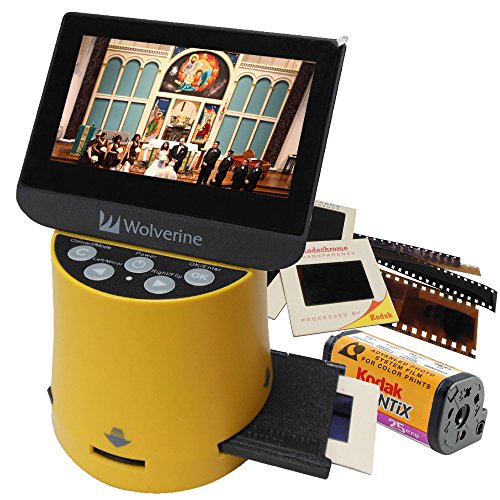





Speed & Workflow:
You can process big batches quickly with speed-load adapters and captures in about 3 seconds per frame. Review on the built-in 4.3-inch color screen or connect via HDMI for living-room curation, then save directly to an SD card for share-ready files. At 20 megapixels, scans look crisp for slideshows, photo books, and digital frames.
Standout Features & Use Cases:
You get standalone operation, plug-and-play setup, and format flexibility across 35mm, 110, 126, 127, and APS, so mixed collections are easy. The 4.3-inch screen, HDMI output, speed-load adapters, and 20 megapixels turn hours of work into an afternoon project with clear results you can enjoy right away. Perfect for: bulk slide conversion, family photo archiving, APS and 127 film scanning.
Who It’s For:
Who is this for? Budget-friendly family archivists and casual photographers who want quick, computer-free conversions and simple on-screen review. If you value speed, ease, and shareable JPEGs over complex software, this model fits your workflow.
Our Verdict:
Final recommendation: Choose this option if you need a hassle-free way to digitize mixed film formats at home and finish projects fast. Its strong price-to-performance ratio, straightforward controls, and instant viewing make it an easy pick for turning boxes of memories into organized, ready-to-share files.
BEONE GLOBAL BEONEGLOBAL ClearScan S5 Film
Hobbyists and family archivists who want fast, low-effort digitization of many slides/negatives into shareable JPEGs without paying for pro gear
- Plug-and-play standalone operation with a large 5″ LCD preview — very convenient for batch, no-computer scanning
- Supports a wide range of film types (135, 126, 110, Super8) so you can scan mixed shoeboxes without adapters
- Very affordable entry-level price with strong recent sales and a solid 4.4 rating — good value for casual use
- 24MP claim is based on a small 1/2.3″ CMOS sensor — likely interpolated detail and limited true optical resolution
- No mention of infrared-based dust/scratch removal (Digital ICE) or advanced dust handling — extra cleanup will be needed for dirty/aged film
Got piles of family slides and want them on an SD card or ready to share? You’ll digitize large batches quickly with one-touch scanning and on-screen preview — you get fast, shareable JPEGs without needing a computer. The tradeoff: your scans won’t match high-end film scanners in fine detail or dynamic range, so accept a bit more post-cleanup if you plan large prints. Overall, you save time and money while getting good-looking digital copies for frames, social media, and casual archiving.
Quick Overview:
This film scanner brings fast, no-computer archiving to your desk—our #4 choice with a strong 79/100 for value and convenience. Turn decades of slides and negatives into clear, shareable JPEGs in a single sitting.

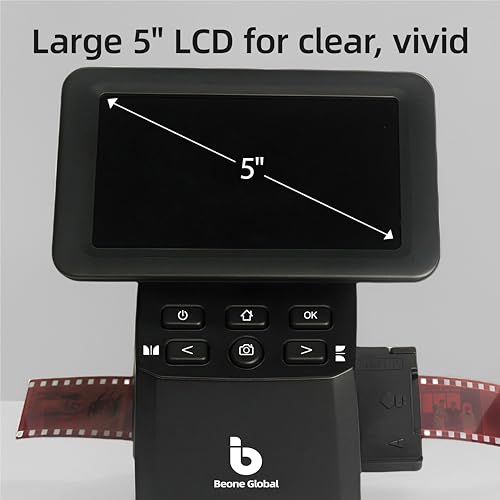
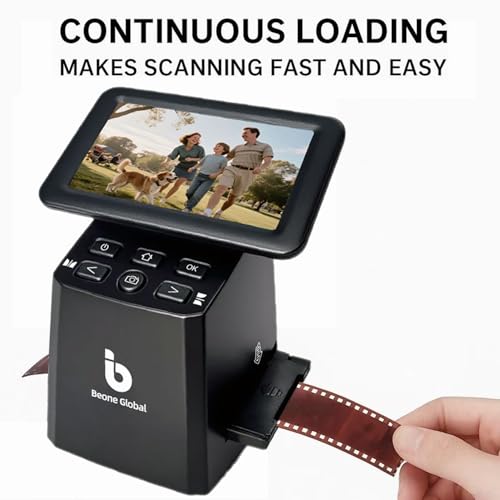
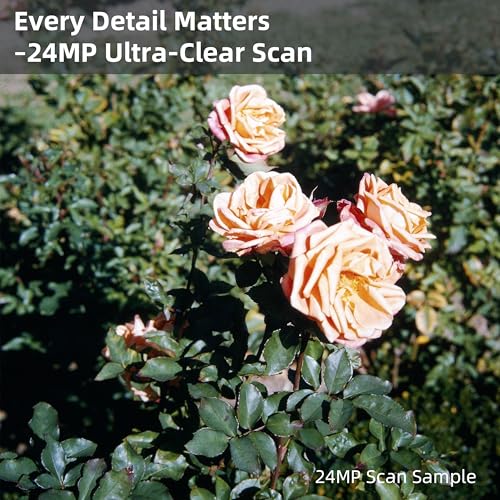
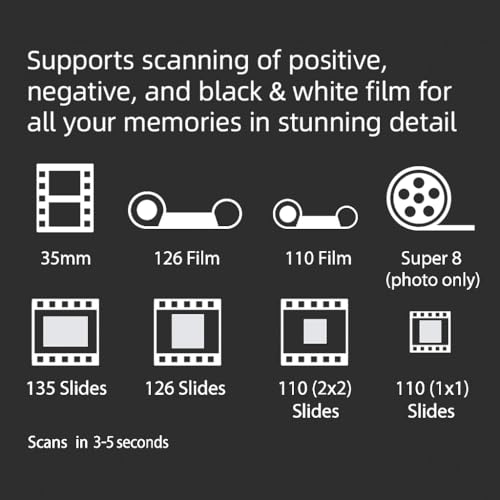
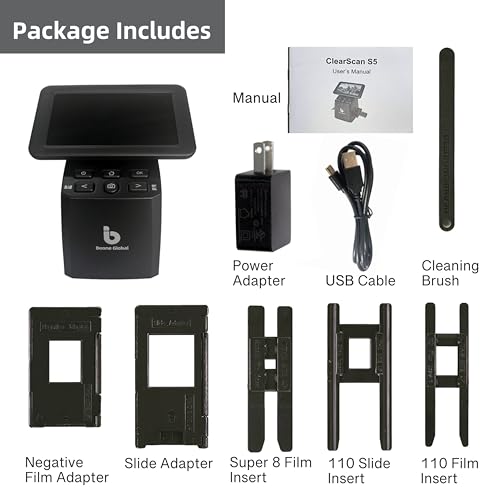
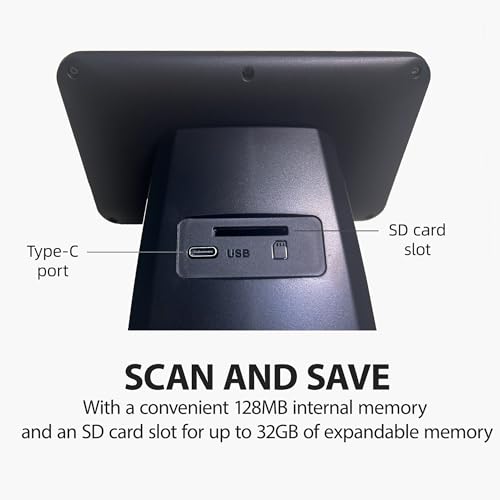
Standalone Scanning & Workflow:
Preview each frame on the large 5-inch LCD, then capture with one-touch simplicity. Save 24MP JPEGs straight to an SD card (with USB transfer when you need it), so you can scan at the kitchen table and share later without booting a computer.
Standout Features & Value:
Handle mixed collections thanks to multi-format support (135/126/110/Super8) and fast-loading holders that speed through batches. You get standalone operation with an SD slot and one-touch scanning, plus a proven 4.4 rating that underscores reliable performance at a budget-friendly price.
Who It’s For:
Who is this for? Family archivists and hobbyists who want quick, computer-free conversions for frames, slideshows, and social posts. Perfect for: bulk family archiving, mixed-format shoeboxes, share-ready JPEGs.
Our Verdict:
Final recommendation: Choose this model if you want speed, simplicity, and broad format coverage in a compact unit. It offers an excellent price-to-performance balance with on-screen previews, easy saves, and flexible film support that help you finish big projects faster.
ClearClick Virtuoso 3.0 22MP
Hobbyists and family archivists who want a fast, simple, affordable way to convert shoebox slides/negatives into JPEGs for sharing, printing up to A4 at moderate quality, and viewing on TVs or digital frames. Not ideal for serious film restorers or those who need RAW output, high dynamic range, or advanced dust removal.
- Plug-and-play standalone operation — scans directly to SD card with a large 7″ preview screen
- Affordable price at the top of the entry-level range (good value for casual digitizing)
- Compact and easy to use for rapid batch scanning of slides/negatives (35mm, 110, 126)
- Limited optical resolution and reliance on interpolation (real detail is modest — ~3824×2512 native capture)
- No infrared-based dust/scratch removal (Digital ICE) or advanced dust-removal tools
Want to quickly digitize a shoebox of family slides and get shareable photos without a computer? You can pop slides into the ClearClick, preview and scan on the 7″ screen, and save JPEGs straight to an SD card — fast and fuss-free. The tradeoff: you’ll give up high-end detail, RAW output, and IR dust/scratch removal, but you’ll gain a simple, affordable workflow that gets hundreds of memories online or into frames with minimal effort.
Overview & Ranking:
Compact design brings simple, computer-free archiving to your desk — ideal when you want shareable scans fast. Positioned at #5 with a solid 79/100, this pick blends ease of use, speed, and value for turning family film into ready-to-share files. Consistently high ratings reinforce its dependable, everyday performance.


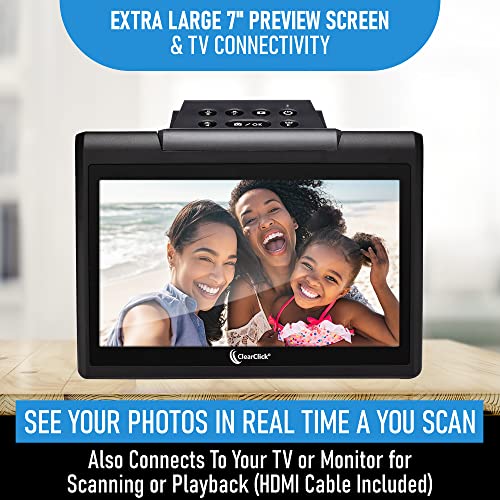
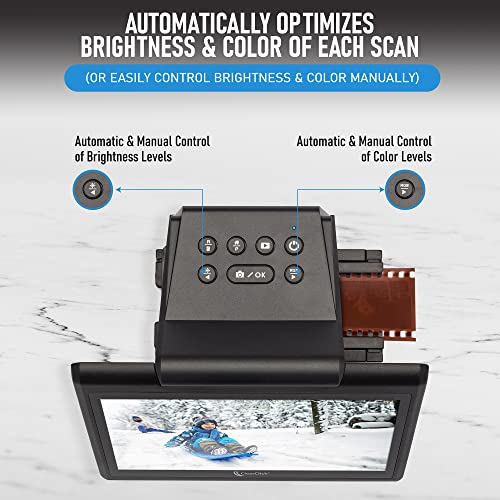
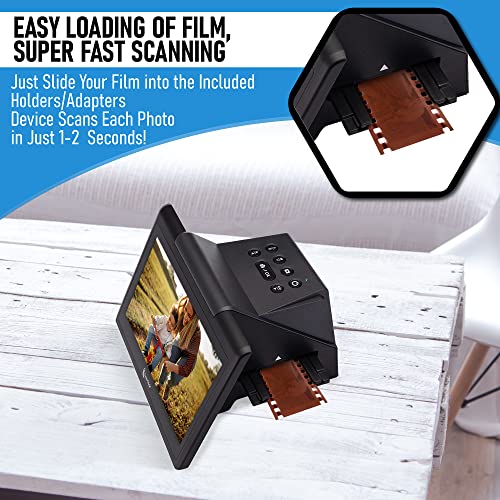
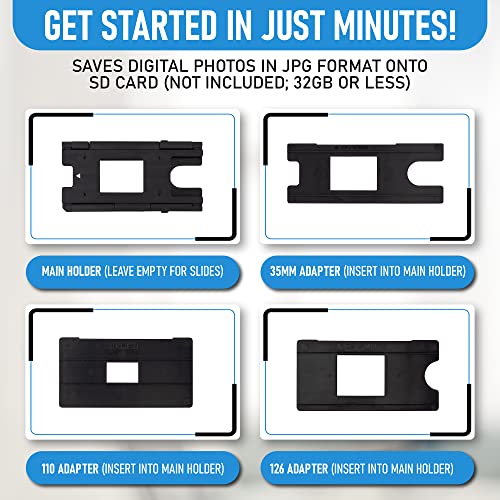
Ease of Use & Workflow:
You scan directly to an SD card using the big 7-inch LCD for real-time preview, so you can correct orientation and exposure before you hit save. The standalone operation keeps your desk uncluttered and lets you digitize anywhere, then plug in via mini HDMI to show results on a TV.
Image Capture & Formats:
It captures up to 22MP JPEGs and supports 35mm, 110, and 126 film, covering the most common family archives. Files are crisp enough for web sharing, slideshows, and prints up to A4, giving your old frames a clean new life without extra software.
Who It’s For:
Who is this for? If you want fast, fuss-free conversions you can do at the kitchen table, this model keeps the process simple and consistent. Perfect for: family archiving, quick batch digitizing, sharing on TVs and digital frames.
Our Verdict:
Standout features include standalone operation, a 7-inch LCD preview, rapid batch scanning for slides/negatives, and a simple SD card workflow with a 2-year warranty backing it. Final recommendation: choose this if you want a competitively priced, reliable way to turn shoebox film into hundreds of shareable photos with minimal setup.
ClearClick Virtuoso 2.0 22MP
Budget-minded family archivists who want fast, plug-and-play digitization to JPEGs for sharing and display; casual hobbyists who prioritize convenience over maximum archival quality.
- Plug-and-play standalone operation — scan directly to SD card or view on the large 5″ preview screen (no PC required)
- Affordable entry-level price that fits the budget buyer bracket ($149.95)
- Wide format support for common amateur slide/negative types (35mm, 110, 126) and HDMI output for quick review
- Interpolated ’22MP’ resolution rather than high-quality optical scanning — limits detail for large prints or fine archival work
- No Dust & Scratch removal (no Digital ICE/infrared) and no RAW output — makes restoration-heavy workflows harder
Want to get through a shoebox of slides fast and share them? You can pop slides into this unit, preview on the big screen, and save ready-to-share JPEGs to an SD card without touching a computer. You’ll save time and make instant digital keepsakes for social media and digital frames — the tradeoff is that you won’t get RAW files, true high-res optical scans, or built-in dust/scratch removal for deep restorations. If your priority is speed and simplicity for family memories, you’ll be happy; if you need archival-grade scans for large prints or serious color correction, expect to step up to a Plustek/Epson-type scanner.
Quick Overview:
This standalone film and slide scanner brings fast, no-fuss digitizing to your desk—ideal when you want to turn family slides into shareable photos in minutes. It comes in at #6 with a solid 77/100 for convenient workflow, broad format coverage, and strong value for home archiving.
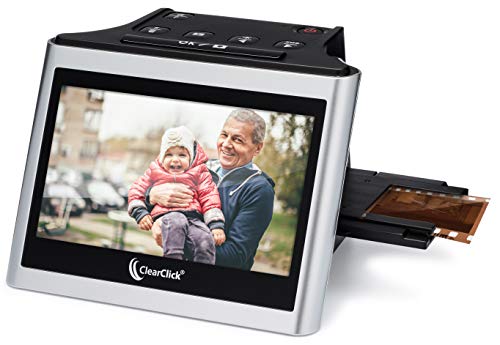




Workflow & Standout Features:
With a standalone workflow, you preview on the 5-inch LCD, then save straight to an SD card in seconds for computer-free scanning. Flexible review via HDMI output makes it easy to gather the family around a TV, while 22MP captures deliver ready-to-share JPEGs. The wide format support (35mm, 110, 126) handles typical family collections with simple holders for quick batches.
Use Cases & Scenarios:
Tackling a shoebox of slides for a reunion or digitizing negatives for a digital frame is straightforward, and you can move through stacks quickly with the guided holders. Perfect for: bulk family archiving, quick social sharing, digital frame loading.
Who It’s For:
Choose this if you want a simple, computer-free way to preserve decades of memories and organize them for easy viewing. It suits casual shooters who value speed, consistent results, and a smooth, living-room-friendly review experience.
Our Verdict:
Final recommendation: A smart, budget-friendly pick that balances speed, ease, and share-ready files for everyday archiving. Who is this for? Family archivists and amateur photographers who want fast, plug-and-play JPEG conversions with big-screen previews and SD card convenience.
Magnasonic All-in-One 24MP Film
Budget-minded family archivists and casual hobbyists who want fast, no-computer JPEG scans to an SD card or TV for sharing and display
- Truly plug-and-play standalone operation (5″ LCD, SD card, HDMI) — great for quick, no-PC scans
- Very affordable entry price with fast throughput (~5 seconds/scan) — ideal for bulk shoebox digitizing
- Proven popularity and reliability signals (4.3★, 3,200+ reviews, strong recent sales)
- Image quality is basic: 24MP is effectively an interpolated consumer sensor, not film-grade optical scans
- No professional dust/scratch removal (no Digital ICE/infrared) or RAW output — limits restoration and high-DPI archiving
Want to get hundreds of family slides into shareable photos fast? You’ll scan each slide in seconds to JPEG on an SD card or view them on your TV without touching a computer. You get massive time savings and a very low cost per scan; the tradeoff is that you’ll sacrifice the fine detail, dynamic range, and dust-removal you’d get from a dedicated film scanner or pro lab — but for social sharing and simple archiving, you’ll finish your shoeboxes much faster.
Quick Overview:
Boxfuls of slides to tackle? This budget-friendly film scanner brings fast, standalone archiving to your living room — which is why it earns #7 in our guide with a solid 75/100 for speed and simplicity. You get quick results without a computer, perfect for sharing and preserving memories.
Speed & Standalone Convenience:
Standalone operation means you scan directly to an SD card on a bright 5-inch screen and preview everything before saving. With < 5 seconds per image and HDMI for instant TV viewing, you can move through hundreds of frames in an afternoon. The 24MP output gives you ready-to-share JPEGs that look great on phones, tablets, and digital frames.
Standout Features & Value:
You get a large 5-inch LCD, simple HDMI output, flexible SD storage (up to 128GB), and versatile film support for 35mm/110/126/Super 8 in one compact unit. Optional tray bundles streamline batches of negatives or slides for fewer swaps and faster flow. Perfect for: bulk slide scanning, family album archiving, TV slideshow sharing.
Who It’s For:
Who is this for? Family archivists and casual shooters who want speedy JPEG scans without software headaches. If you prefer a simple, living-room workflow with easy TV playback and minimal setup, this choice fits your pace.
Our Verdict:
Final recommendation: Choose this model if you value fast, computer-free scanning and share-ready results at a budget-friendly price point. It offers a strong price-to-performance ratio for large family projects, and the variant bundles add handy flexibility for negatives or slides.
KODAK Mini Digital Film
Budget-minded family archivists and casual hobbyists who want fast, standalone, plug-and-play slide conversion to JPEG for social sharing, digital frames, and quick prints — not for enthusiasts seeking archival-grade scans.
- True plug-and-play standalone operation: scans directly to SD card (no PC required) with a preview LCD
- Multi-format adapters (35mm, 126, 110, Super 8 & 8mm) for fast batch conversion
- Affordable price (~$140) with strong popularity and many reviews — good value for quick digitizing
- Image quality is consumer-grade: JPEG-only output (claimed 22MP is largely interpolated) with limited dynamic range and color depth
- No advertised Digital ICE / infrared dust-and-scratch removal — you’ll need manual cleanup or software for heavy restoration
Need to digitize a shoebox of family slides fast? You get one-button, standalone scanning that writes JPEGs to an SD card so you can preview on the LCD and drop images straight onto social media or a digital frame. The tradeoff: you trade archival-grade detail and advanced restoration tools for speed and simplicity — excellent for mass conversion and sharing, not for A4 archival prints or high-dynamic-range restoration.
Quick Overview:
This compact scanner brings plug-and-play convenience and multi-format support—perfect when you want to power through family slides without a computer. It ranks #8 with a solid 73.5/100, thanks to fast operation and excellent value for mass digitization.




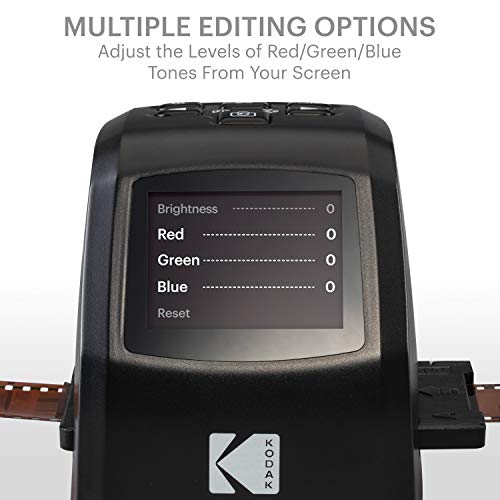


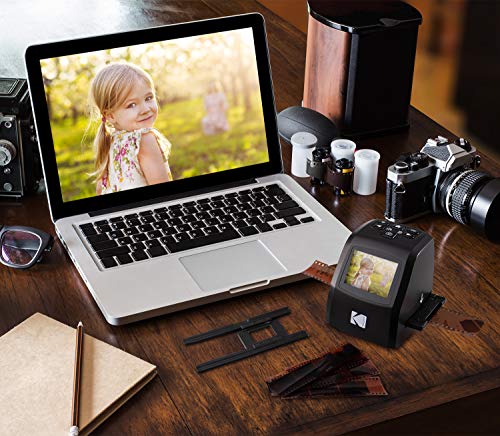

Formats & Output:
Easy-load adapters handle 35mm, 126, 110, Super 8, and 8mm film so you can batch quickly and keep momentum. You get 22MP JPEGs that are ready for social sharing, digital frames, and quick prints, which keeps your workflow simple and consistent.
Standout Features & Value:
You get standalone scanning, SD card saving, multi-format adapters, easy-load holders, and a 2.4-inch LCD for instant previews. This combination offers a strong price-to-performance ratio if your goal is to convert decades of film into clean, ready-to-share files without extra software.
Who It’s For:
Perfect for: mass family archiving, social sharing, digital frame displays. Who is this for? Choose it if you want quick, reliable conversions with minimal setup and you prioritize speed over deep post-processing.
Our Verdict:
This pick delivers fast conversions, straightforward controls, and flexible format coverage that make preserving memories feel easy. Final recommendation: go for this model if you need hundreds of slides turned into consistent, share-ready JPEGs on a budget-friendly timeline, and you want a dependable #8 choice with proven results.
Magnasonic All-in-One 25MP Film
Casual family archivists or budget hobbyists who want fast, easy slide/film-to-JPEG digitization on an SD card or TV — ideal when you need quick shareable images rather than archival-grade scans.
- True plug-and-play standalone unit — 5″ preview screen, SD card slot and HDMI output so you can scan without a computer
- Very affordable entry-level price (~$130) and fast per-frame scan times (advertised <5 seconds), good for large shoebox jobs
- Broad film format support (35mm, 110, 126, Super 8/8mm/135) — versatile for mixed family archives
- No mention of Digital ICE or infrared-based dust & scratch removal — you’ll need manual cleanup or third‑party software for heavy defects
- The “25MP” figure is almost certainly from an interpolated sensor; expect limited true optical resolution and modest dynamic range compared with film scanners like the Plustek/Epson mid-range units
Need to digitize a pile of family slides quickly? You get a simple, standalone workflow: pop slides into the trays, preview on the 5″ screen (or TV via HDMI), and save JPEGs directly to an SD card in seconds. The tradeoff: you give up RAW output, high optical DPI, and automatic infrared dust removal — but you’ll capture shareable, color images fast so you can start sharing and organizing family memories today.
Quick Overview:
The Magnasonic All-in-One 25MP Film Scanner provides fast, computer-free archiving for families and hobbyists. This pick comes in at #9 with a solid 69/100 score because it prioritizes simple setup and versatile format handling—perfect when you want to move from box to SD card without fuss.
Practical Use & Setup:
You can scan without a computer thanks to the 5-inch preview screen, SD card slot (up to 128GB), and HDMI output. Load film into the holders, preview, and save 25MP JPEGs in seconds so your project keeps moving.
Standout Features & Value:
Versatile multi-format support covers 35mm, 110, 126, and Super 8/8mm, so one device can handle a mixed family archive. The mix of standalone workflow, 5-inch display, HDMI output, and on-board storage (64MB plus SD expansion) delivers excellent value compared to more complex software setups. Choose the bundle with slide or negative trays for faster loading, or the SD card bundle for instant, out-of-the-box storage.
Who It’s For:
Who is this for? Family archivists and hobbyists who want quick, shareable scans without paying lab fees or managing complex software. Perfect for: shoebox scanning, family slide nights, quick social sharing.
Our Verdict:
Final recommendation: Pick this model if you value speed, simplicity, and broad film coverage in a compact unit. It delivers a smooth, TV-friendly workflow with HDMI, a clear 5-inch screen, and reliable SD saving, making it an easy, budget-friendly way to bring old film into your digital life.
BEONE GLOBAL BEONEGLOBAL ClearScan MINI Film
Budget-minded family archivists and casual hobbyists who want fast, standalone conversion of slides to JPEGs for social sharing and digital frames. Not ideal for enthusiasts needing RAW output, high dynamic range, or automated dust/scratch removal.
- True plug-and-play standalone operation — scans directly to SD card with a built-in LCD, ideal for quick batch digitizing
- Very affordable price point ($69.98) with a claimed 16MP CMOS sensor — strong value for casual sharing and small prints
- Strong sales momentum and solid rating (4.3) indicate current popularity and acceptable real-world performance
- No mention of dust/scratch removal (Digital ICE / infrared) — a major omission for archivists wanting clean scans without manual retouching
- Limited professional features: no RAW output, unclear software/OS integration, small sensor size likely limits dynamic range and color depth
Want to digitize shoebox slides quickly and share them right away? You’ll scan slides straight to an SD card using a compact, easy-to-use unit and be posting memories within minutes. The tradeoff: you’ll get good-looking JPEGs for screens and small prints but you won’t get RAW files, advanced dust/scratch removal, or the tonal latitude needed for high-end restorations — if you care about archival-grade scans or heavy restoration, plan to step up to a mid-range film scanner or invest more time in manual cleanup.
Quick Overview:
This compact film scanner brings fast, standalone archiving for budget-minded families—our #10 pick with a solid 68/100 for value and simplicity. You get quick slide-to-JPEG conversion without a computer, so your memories move from box to screen in minutes.

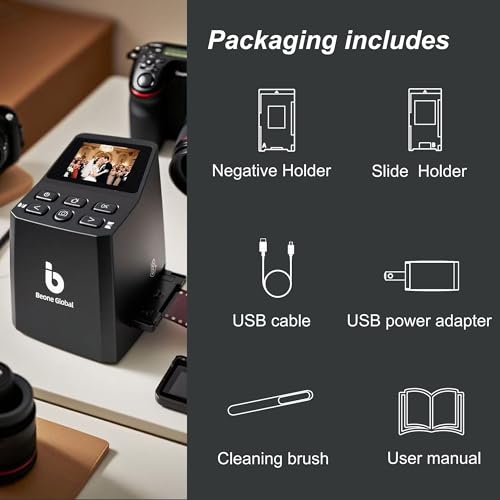
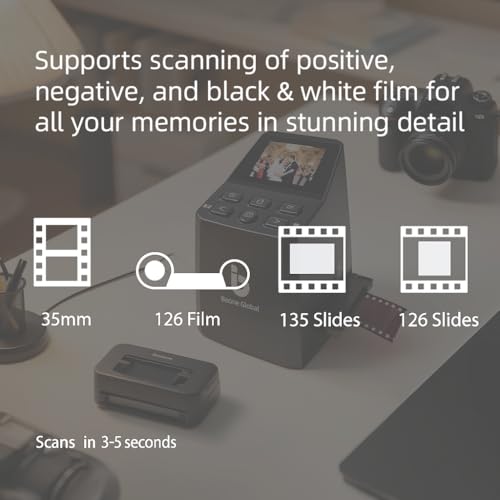
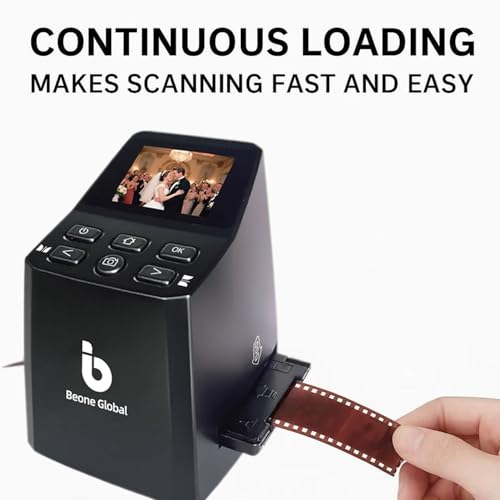
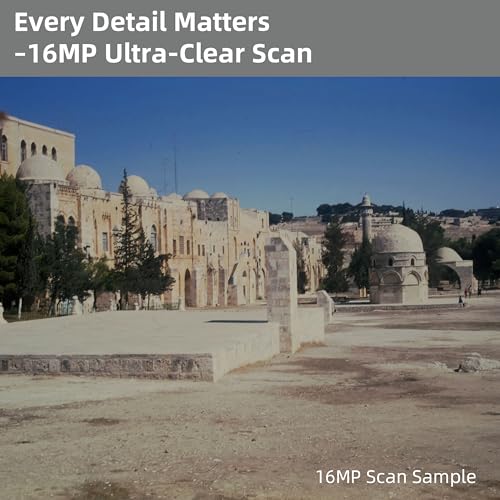
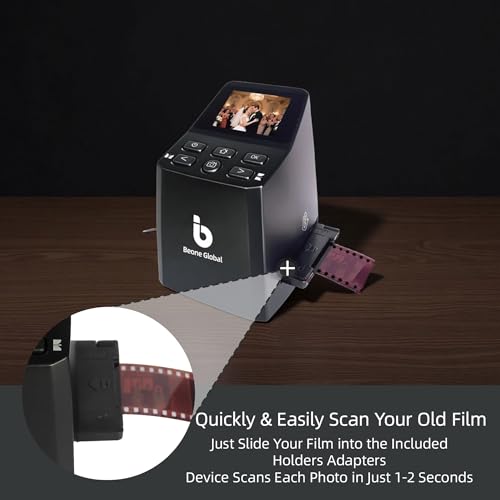
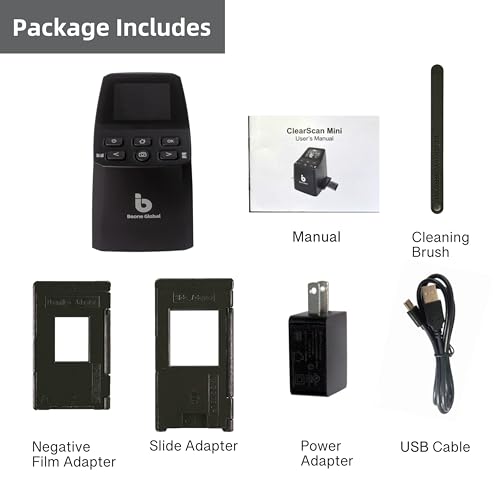
Scan Quality & Workflow:
A 16MP sensor captures clean detail that looks great on screens and small prints. It handles 35mm/135/126 film and slides, previewed on a bright 2.31″ LCD so you can frame and adjust before saving. With direct-to-SD storage (up to 32GB), you can batch digitize efficiently and keep the process smooth.
Use Cases:
Perfect for: family slide shoeboxes, digital photo frames, quick social sharing. If you want to scan a vacation carousel or a bundle of negatives before a reunion, this model keeps the workflow simple and steady.
Who It’s For:
Who is this for? You if you want a plug-and-play way to preserve family memories, prefer a small, clutter-free setup, and plan to share images online or on a living room frame. It’s a smart match when you value standalone operation, built-in LCD previews, and direct SD saving for fuss-free archiving.
Our Verdict:
Final recommendation: Choose this option if you want speedy, computer-free conversions with dependable results for everyday viewing. It earns the #10 spot for balancing ease, portability, and a strong price-to-performance ratio, making it a practical pick for casual archiving at home.
Your Perfect Film Scanner: Final Picks by Use Case
KODAK Slide N SCAN Film
Kodak SCANZA Digital Film &
Magnasonic All-in-One Film Scanner
Wolverine Titan 8-in-1 High Resolution
KODAK Mini Digital Film &
Disclosure/Disclaimer: As an Amazon Associate, we earn from qualifying purchases. Certain content was provided "as is" from Amazon and is subject to change or removal at any time. Product prices and availability: Amazon prices are updated daily or are accurate as of the date/time indicated and are subject to change. Any price and availability information displayed on Amazon.com at the time of purchase will apply to the purchase of this product.

